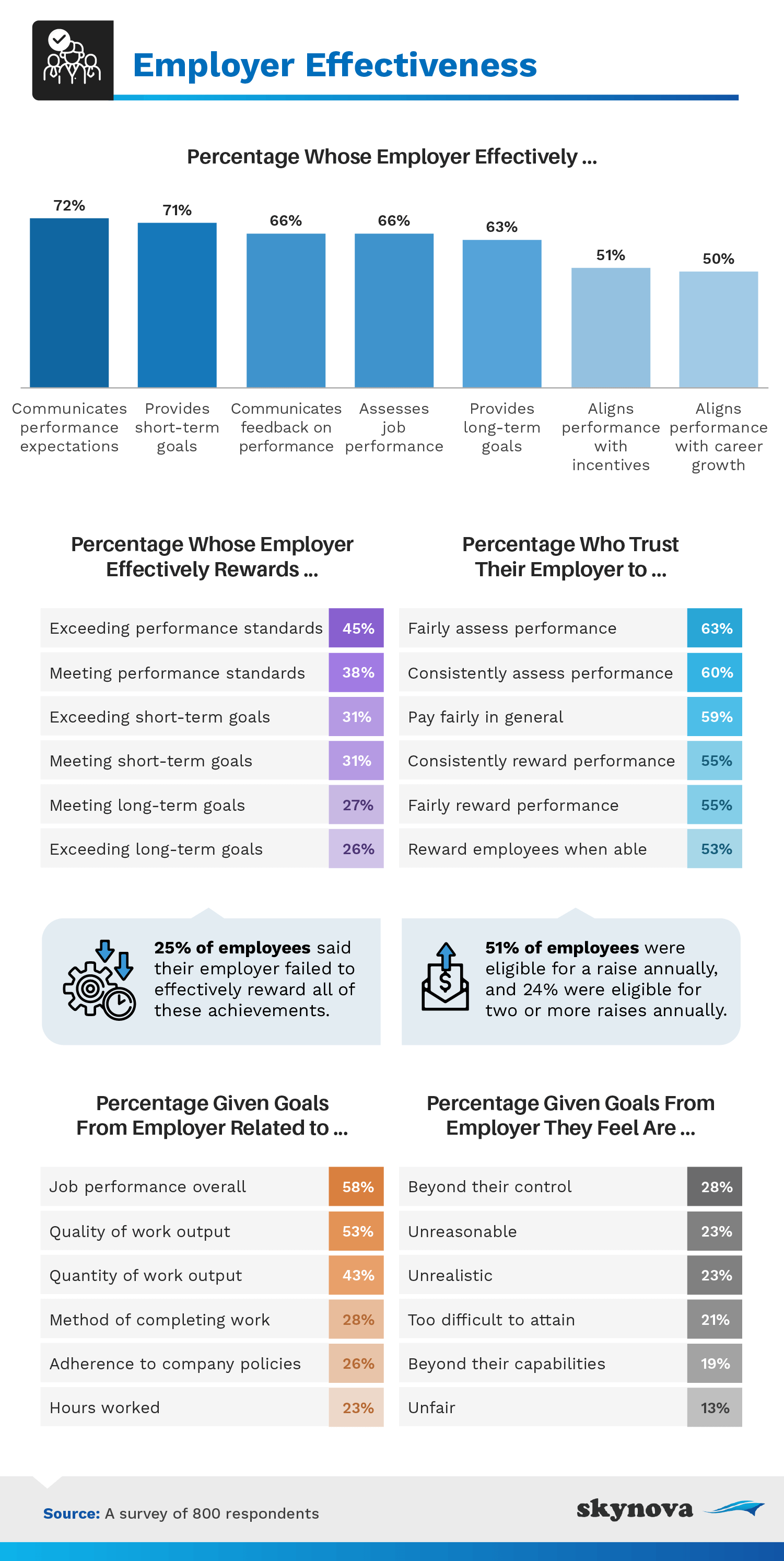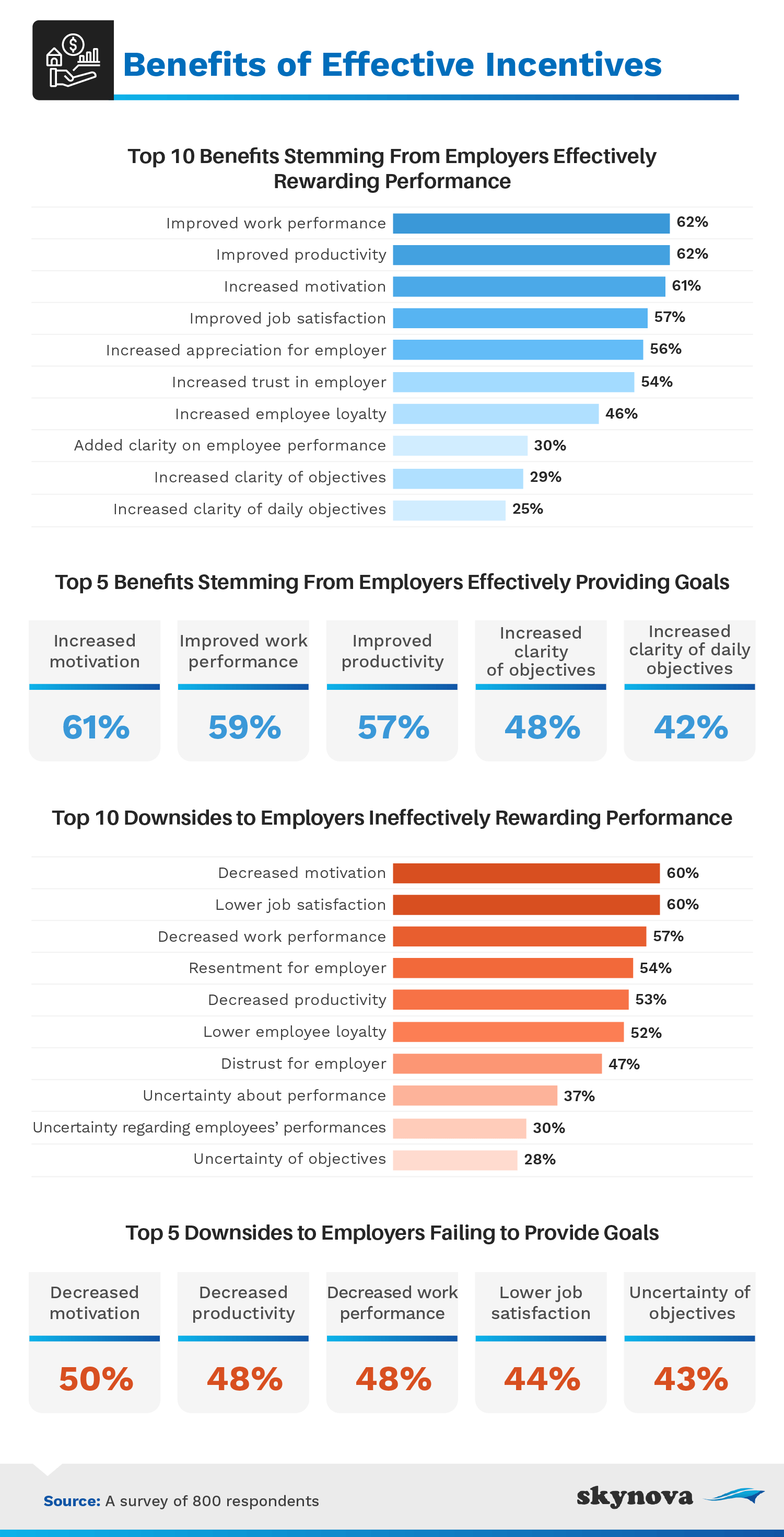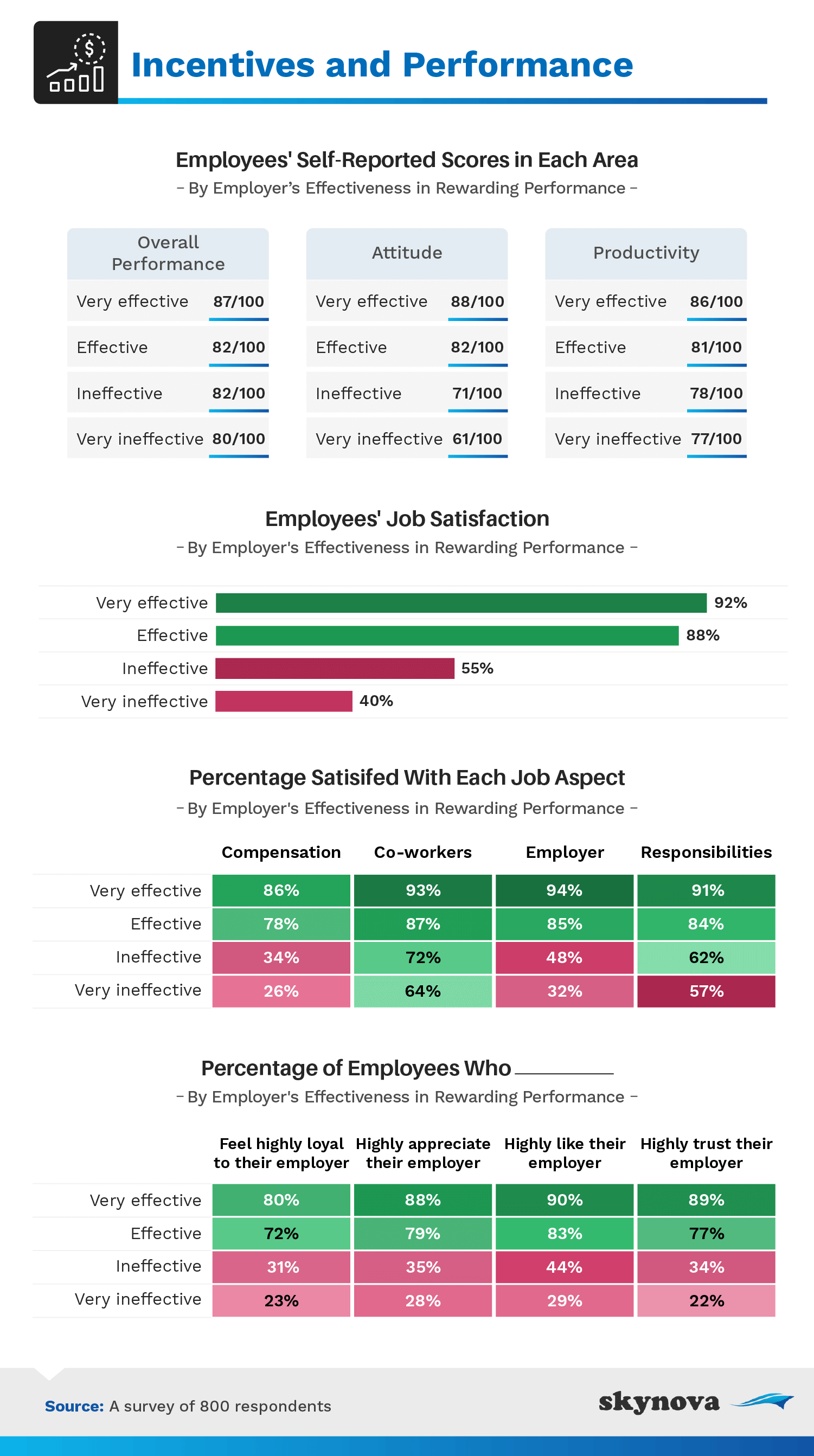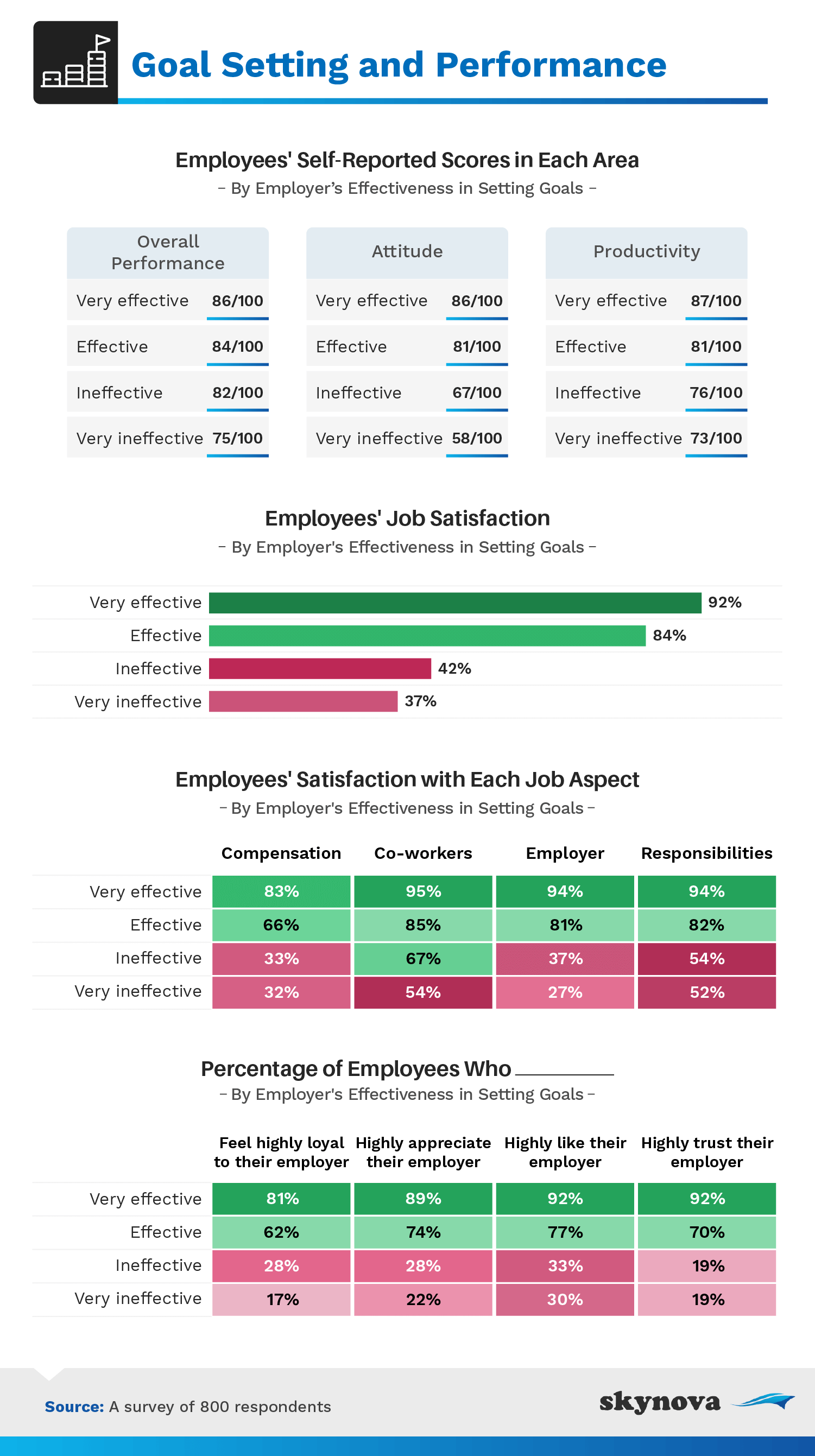
|
We all know that achieving a highly-motivated and successful work environment starts at the top - it's up to employers to set the tone and instill the necessary culture for their employees to thrive in. We asked 800 workers to rate their employer's effectiveness based on a number of variables, primarily revolving around goal setting and performance rewards.
We'll start off with an overview of employer effectiveness in different areas of leadership and then transition into more details of the employee perspective - what do they think are some benefits of effective performance rewarding, and what are the downsides of not receiving any? We'll also analyze various aspects of employee job satisfaction and attitude toward their employers in relation to the rewards and goal-setting strategies they've been given.
Getting right to the thick of it, we assessed how effective employers have been in terms of leadership qualities from their employees' perspective.

According to over 70% of respondents, their employers were effective at communicating performance expectations as well as providing short-term goals, which can lead to an increase in motivation and less procrastination. All of the evaluation metrics above revolve around performance and goal setting, and at least half of respondents felt as if their higher-ups were employing them effectively.
Regarding rewards, 45% said they've received one for exceeding performance standards, whereas 38% were congratulated in some way for meeting performance standards. A quarter of employees felt that their employers did not adequately reward them for their achievements. Sixty percent or more trusted their employer to assess their performance both fairly and consistently, and while just over half of employees were eligible for a yearly raise, just under a quarter were eligible for one twice a year or more often.
Employers tended to give their employees overall job performance-related goals the most, followed by ones revolving around the quality of their output. Although, over a fifth of employees felt as if their goals were beyond their control, unreasonable, unrealistic, or too difficult to attain.
Let's take a look at the benefits of employers rewarding their employees adequately versus the downsides of not doing so at all.

When employers effectively rewarded performance, over 60% of employees said their work performance, productivity, and motivation all improved. More than half also felt more job satisfaction and more appreciation and trust in their employer. In regards to employers setting effective goals, the benefits were the same - increased motivation, work performance, and productivity were the top three.
Unfortunately, the exact opposite happened when employers failed to effectively reward performance and provide clear goals - a decrease in motivation, job satisfaction, work performance, and productivity occurred. Employees were also more likely to resent their employers. Poor management can lead a business's performance down a slippery slope by stifling employees' urge to excel. Consequently, some get scared of losing their jobs, and while employers may think frightened employees will work harder, that's simply not the case.
In the following section, we asked employees to continue reflecting on their employers' leadership effectiveness regarding various aspects of their job.

Based on their employer's effectiveness of rewarding them for their overall job performance, attitude, and productivity, employees were asked to rate them on all three fronts. Naturally, very effective rewarding led to higher scores across the board. The biggest drop can be seen with attitude, where ineffective rewarding resulted in much lower attitudes, compared to the other areas that factor into performance.
Regarding job satisfaction, unsurprisingly, employers who used effective rewarding strategies had the highest satisfaction rate among employees, at 92%. There was a major drop-off for ineffective and very ineffective rewards, with satisfaction scores of 55% and 40%, respectively.
Assessing satisfaction in other areas, like with compensation, co-workers, employers, and responsibilities, high reward effectiveness once again led to very satisfied employees and decreased the less effective it was. Constructive and helpful rewarding techniques also resulted in a higher level of loyalty, appreciation, fondness, and trust toward an employer.
Another major benefit of effective rewarding is employee retention. Satisfied employees are more likely to stay, minimizing a lot of headaches that come with turnover. Aside from rewards, other ways to increase employee retention include identifying the right candidates for the job right off the bat, providing clear paths for advancement, and being transparent with them.
Setting goals is necessary for employees to succeed - how effective are employers at setting them, and how do employees react when they are not up to par?

We've assessed employees based on the same metrics, but this time according to employers' effectiveness of setting goals. Once again, employees with clear-cut and achievable goals had much higher scores for their overall performance, attitude, and productivity. Very ineffective goal setting led to uninspiring attitude scores.
They also got increasingly dissatisfied with their jobs the less effective their goals were, with only 37% of employees being satisfied when presented with very ineffective goals. Effective goals are crucial for job satisfaction - they help minimize stress as tasks become clearer and more digestible, leading to less wasted time. If employees can work in an organized fashion with clear guidelines, they are sure to produce higher quality work and gain confidence.
For compensation, relationships with co-workers and employers, as well as their responsibilities, employee sentiment toward each declined when the goal-setting effectiveness did, too. Very ineffective goals led to a very low level of satisfaction with their employer - only 17% felt highly loyal to employers if their assigned goals weren't effective at all.
Clearly, effective rewards and goal setting lead to generally increased employee satisfaction in areas like overall performance, attitude, and productivity. When an employee is given the necessary tools to succeed, they do just that. An effective leader can create the necessary culture for employees to thrive, and in turn, the employees contribute to its success.
On top of effective reward and goal setting, by being honest and open communicators, providing constructive feedback, and generally considering employee needs, employers can create a workplace where everyone can feel like they're making a positive impact.
At Skynova, our focus is on providing you with top-notch online invoicing services. We also have 37 online software models designed specifically for small businesses to ensure the highest level of organization and ease of use for your company's various needs. Designed to work together, you can effortlessly track your business's expenses, run financial reports, and enjoy many other analytical tools. We also love to produce our own articles, generally revolving around the workplace, as seen here with the employee/employer relationship - we use primary data conducted by ourselves to bring our articles to life.
We surveyed 1,150 respondents and qualified 800 of these based on their full-time employment status and other employment-related aspects. Among those 800 respondents, 324 were female, 472 were male, 2 identified as non-binary, and 2 did not report their gender. Our respondents ranged in age from 18 to 66, with an average age of 38.
In order to help gather accurate responses, all respondents were required to correctly respond to a decoyed attention-check question. Some questions and answers have been paraphrased or rephrased for clarity or brevity. These data rely on self-reporting, and potential issues with self-reported data include telescoping, selective memory, and attribution errors.
We hope you enjoyed reading about the many variables that dictate the employer/employee relationship. If you think you know someone who might enjoy this article, feel free to send it their way. We only ask that you do so for noncommercial use and that you provide a link back to the original page so readers can have access to our full findings and methodology.